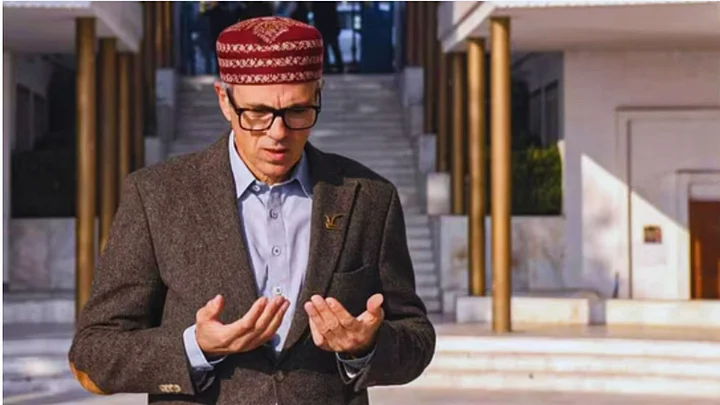Politics is the art of the possible.
Omar Abdullah, who just a few months ago, was all set to boycott the polls in Jammu and Kashmir, is now the chief minister, exemplifying the unique ups and downs of Indian politics.
His extraordinary feat of leading the National Conference, in an alliance with the Congress party, to a convincing victory against all odds must be feeling particularly sweet after his humiliating defeat in the Lok Sabha polls from Baramulla to ‘Engineer’ Rashid, a known Kashmiri separatist, incarcerated on terror funding charges, released and sponsored by the BJP to bring about Omar's downfall.
While other Opposition leaders in the INDIA bloc were exultant about the national elections diminishing the status of Prime Minister Narendra Modi and the BJP, Omar's shocking defeat, carefully planned by the ruling party, appeared to be the final blow to his political career, given his and the party's steep decline.
He had consistently maintained that he would not contest the assembly polls in Jammu and Kashmir after the abrogation of Article 370, which took away its semi-autonomous status and downgraded it from a state to a union territory. However, it did not take long for Omar to be persuaded not to give up so easily by his father, the ever-optimist Farooq Abdullah, along with a host of INDIA bloc leaders including Rahul and Priyanka Gandhi.
Yet, the challenge looked formidable with an array of small parties and Independents propped up in the Valley, many of them with known separatist sympathies, set to eat into the popular vote of the National Conference. To make matters worse, its main electoral ally, the Congress party, seemed palpably incapable of harnessing the anti-BJP incumbency in the Hindu-dominated Jammu region since it lacked a credible local leader after the exit of Ghulam Nabi Azad.
Never before had Omar faced such a crucial make-or-break contest in his political career that started off as him being the youngest member of the 12th Lok Sabha in 1998, and that included stints as a Union minister of the Atal Bihari Vajpayee government and a full five-year term as Jammu and Kashmir's chief minister.
Known to be a better administrator than a cunning politician or charismatic orator, the National Conference leader showed his quiet credibility and inner resilience during the assembly elections, rather than the populist rhetoric around the prolonged suffering of people of the Kashmir Valley that politicians always tend to bank on.
Significantly, Omar and his party did not do too badly in the Hindu-dominated Jammu province, winning as many as seven out of the 17 it contested. In stark contrast, the Congress won only a single seat of the 29 it contested. Most importantly, by emerging as the largest single party by far in the assembly, the National Conference scuppered the plans of the BJP to destroy all political opposition in Jammu and Kashmir.
Many political observers feel that the new chief minister has won the electoral battle only to wear a crown of thorns on his head. They point out that with Jammu and Kashmir, downgraded from a state to a union territory and enmeshed by a whole bunch of special laws being a sensitive and terrorism-prone region, Omar will wield extremely limited powers, circumscribed by the centrally appointed Lieutenant Governor (LG).
Indeed, he himself had bitterly remarked as August when explaining why he was determined not to contest for the assembly polls, “I have been the CM of a state, the CM of the (once) most empowered state. I cannot see myself in a position where I would have to ask the LG for appointing my peon. It is as simple as that… I am not going to sit outside the waiting room of the LG and, ask him, ‘Sir, please sign the file’.”
But if he plays his cards judiciously, he will gain credence with the people not just in Kashmir but also in Jammu. He has already made a steady start, refraining from confrontationist posturing against the LG and the central government.
Instead, he has rightly centred his attention on issues of development that concern both Jammu and Kashmir. His support for the plains and not just the Valley is evident by the appointment of a reputed Hindu leader from the region, Surinder Choudhary, as his deputy, and of Satish Sharma in his first cabinet.
The Congress has, for the moment, wisely stayed out of the government, stating that it would not join till Jammu and Kashmir is given full statehood. This gives Omar more elbow room to negotiate with the central government and may not reflect any hidden tension between the two parties. The presence of the Gandhis, along with other leading lights of the INDIA bloc at Omar's swearing-in ceremony, seems to be indicative of this.
Indeed, the restoration of full statehood, which has widespread popular appeal in both Kashmir and Jammu, should be the first major goal of the new government, particularly since both the prime minister and the home minister are on record promising to do so in due course.
(The writer is a Delhi-based senior journalist and the author of ‘Behenji: A Political Biography of Mayawati’. This is an opinion piece. The views expressed above are the author’s own. The Quint neither endorses nor is responsible for the same.)
(At The Quint, we question everything. Play an active role in shaping our journalism by becoming a member today.)
